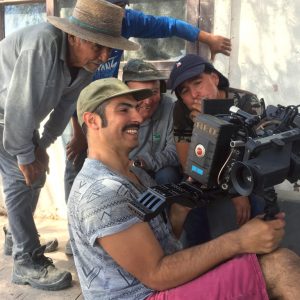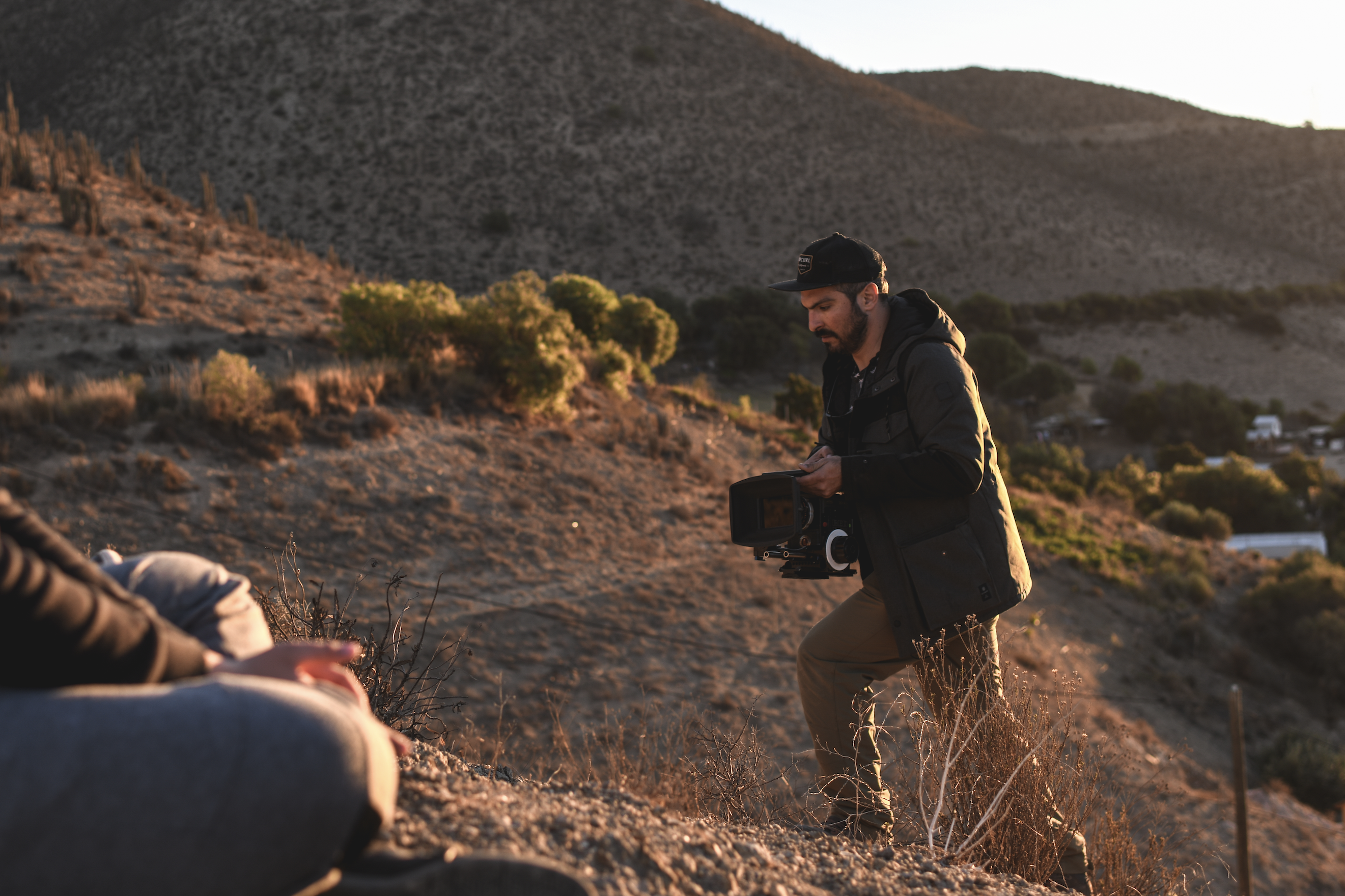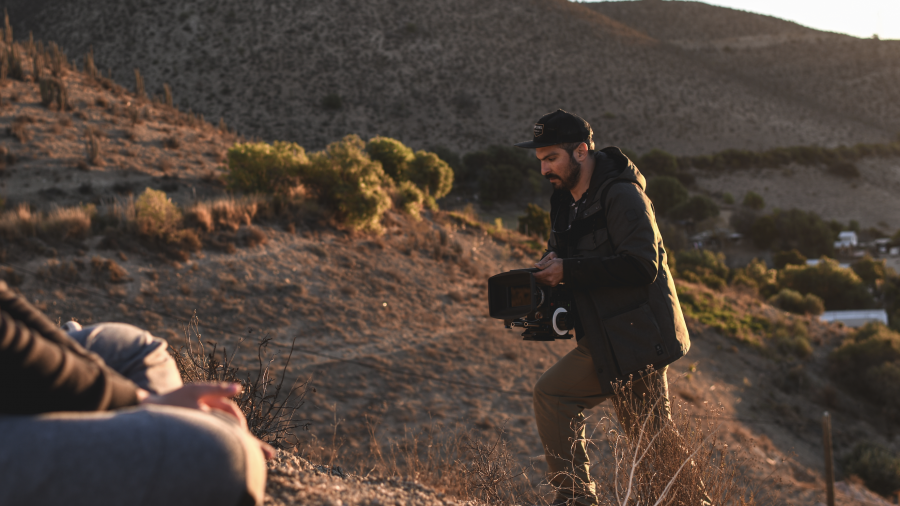Written by Julieta Gozalo
Juan Ignacio Bello is a director, cinematographer and editor based in Santiago, Chile. Throughout his career in advertising, corporate, fashion and documentary work, Juan Ignacio has had an extensive relationship with ethnic groups throughout Chile. He has also delivered content for the whole Latin American audience through short documentaries and TV projects forTelevisa and Riot Games. In 2010, he became the editor of the documentary feature film Voices de Chile in San Francisco, California. Later that year, as a cinematographer, he shot Roads to South Africa and the TV program Camino al Mundial. 2020 marks the release of Imaginarius, Juan Ignacio’s first feature length documentary.
Writer Julieta Gozalo sat down to talk with Juan Ignacio about his film Imaginarius and his descent into filmmaking.

Juan Ignacio Bello shooting an agricultural ethnography documentary back in 2018.
What was your journey into filmmaking?
I would say I was around 16 when I realized that I was going to do filmmaking. I was wondering, “What the hell [am I] going to do with my life?” I love taking pictures, I love art, I love cinema, music, nature and people. It was between anthropology and filmmaking.
At the beginning, all my energy was focused on becoming a cinematographer. I started in advertising, but it wasn’t my thing; I don’t like to sell stuff. I began to make some “Making Of” videos, backstage videos, and shared documentaries. That was pretty interesting because it allowed me to interpret reality through my eyes in a really simple way.
Afterward, I was working in fashion for Televisa in Chile. I was doing very fun stuff and [also] very boring stuff. I got to make a video for The Rolling Stones; I had backstage access, so I was in the first row shooting Mick Jagger.
That’s how I built my career, because it’s not easy making a living in Chile. I wasn’t raised in a family of filmmakers, so I was knocking on a lot of doors at the beginning, I’m still doing it, I’m still working for it. I’m on a constant journey to achieve what I most like, which is filmmaking.
What will audiences get out of Imaginarius ?
We hope they will recognize themselves in these kids in a very simple manner that all religions and genders can relate to. That one kid from Venezuela, the States, or Paris might have the same kind of humor. To give a sense of comfort, a sense of connection, a sense of living and happiness.
What was your inspiration for your film Imaginarius and why was this story important for you?
[In 2019] I began researching about this marvelous phenomenon [the solar eclipse] coming to Chile. I thought, “ I need to shoot this. I need to tell a story based on this phenomenon and in this magical place.”When I was a child, I was always very connected to nature even though I am from a big city. When I was four or six, I was sure that I was going to become an astronomer. I used to see the stars and imagine things. Nowadays, I always connect with that. I love astronomy [and] I really connect with people. From the beginning of my career, [I have looked for] simple things – simple life; simple at its core.
So I began to do research, and I met Christian, who is the director of communications for that region. I wrote some ideas; he really connected with them. He recommended his kid’s school, and a small [student] named Julian. I got the chance to talk with the principal of the school, Gloria, and she presented the [students]. I met with [them], and I knew four [of the] kids were really good friends, and that was the beginning of everything. I became friends with them, their parents, their school teachers and their schoolmates.
I went there without a camera, then with the crew members, and then we shot it. It took fourteen days or so, and two or three trips.
Do you have any interesting stories or anecdotes that occurred during the process?
One time we lost Agustin. He was eating ice cream and met someone, then got very distracted [and] completely forgot about us. He went away and we were like, “We need to shoot! Where’s Agustin?” And he was laying back, laughing on the other side of the square.
With the ending song, the idea of that scene was that they would talk about how that day had developed. And then they started joking, and they sang the song. We didn’t plan [for them to sing] that song; that was also very funny.
Jesus [Letelier], who was one of the directors, had to shoot Amanda during the eclipse and we needed to have permission to shoot Amanda in this private place. At the very last hour we were told “No, you cannot shoot there.”

Behind the scenes of Imaginarius.
So Amanda’s mom did some research and Jesus dressed as a waitress. There were four kids, and I had to separate the four units for [the eclipse]. So there was no filter, no rig, just a small camera.
Why did you decide to go to American Film Market (AFM)? Was it worth your investment in time and money?
I would say yes. You get the chance to attend these amazing seminars about scripts, distribution, producing incentives. I learned a lot. It was like college.
It’s my second time working with AFM. Ten years ago, I got the chance to work as an editor for a documentary shot in Chile called Voice of Chile. And I was the editor of that movie, thanks to AFM.
I met so many nice people from America and all over the world. I love this part of AFM: the social/cultural event. In one of these meetings, Theodore Adams II, a producer from Virginia, was very interested in Imaginarius. Ted turned out to be one of the most professional, comprehensive and friendly people I have ever worked with. Honestly, our meetings at AFM turned out to become a seminar of ethics, life and humanity. Ted is by far the best co-producer that I could ever dream of. He financed the entire post production process of Imaginarius. I’m very excited to get the chance to make more work with Ted, and other connections I made at AFM.
So yeah! We are still on the run working and with our spirits uplifted, super optimistic about the future of humanity and filmmaking.
What is the state of indie filmmaking in Chile right now?
Now is the best moment for Chilean filmmakers in history. First, I need to talk about what just happened in Chile. We were part of this political social burst. We just voted for Appruevo, which means we will become the first country in the world that builds the constitution with a mixture of 50 percent men and 50 percent women. ProChile formed Cinema Chile eleven years ago, a very important platform. Our movie will become part of [Cinema Chile] this December. [Cinema Chile] has a catalogue of all Chilean movies and it helps filmmakers get exposed in the film industry all around the world.
We are very optimistic because things are really moving and change is here. It’s a very good moment for us.
Do you have any upcoming projects?
I have a project that I have been developing for fifteen years, and it gathers so many characters that I have met in real life. They are really connected with nature and they have a simple, but beautiful way of living. It sounds really hippie, but it’s much more than that. It will be ready in about one or two years. Hopefully, it will be a feature film around one-and-half hours; it’s very experimental in a way.
There’s another project that I’ve been developing of a kid that lives in an astronomy hot spot in the Atacama Desert. He has a way of life in the same way of his ancestors, so the way he contemplates nature is unique. [It’s] about the relationship with [him] and an astronomer. That’s all I can tell you and that it will be amazing.
Do you have any advice for other aspiring filmmakers?
It’s all about networking and being efficient. Try to build a friendly crew [that can] co-exist. Trust them, build their trust, and vice versa. Friendship and fun are also part of filmmaking; don’t forget that. Be super organized.
And the last and most important thing: Be patient. Keep walking and creating. The future is yours; take it with courage and respect.
To view a trailer for Imaginarius, click here.

Juan Ignacio Bello behind the scenes of Imaginarius.

